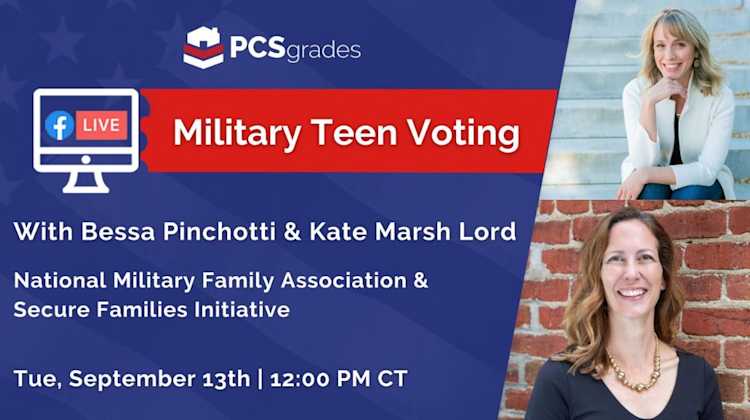Helping Your Teen Cope With Another PCS
by AmeriForce Media - October 13th, 2022

This article was originally published in Military Families Magazine. Read the original article on MilitaryFamilies.com. Follow Military Families on Instagram.
Are you living with a stressed-out teen? Feeling the pressure of schedules packed with Advanced Placement classes, high-stakes standardized testing and activities picked with an eye toward college admissions applications, teenagers are feeling stress in so many areas of their lives.
For teens in military families, the social and academic pressures are compounded by deployments and frequent moves that up the ante in an already pressure-cooker-like environment.
PCS moves and military teens
Navy spouse Lori Blaisdell’s three oldest children all had to navigate through the emotional, social and academic rollercoaster brought about by attending multiple high schools. While all three now are successful young adults, they each experienced their own tearful moment in high school.
Eight months after transferring from a small high school in Tennessee to a top-performing Virginia high school, Blaisdell says her high-achieving oldest daughter came in crying, flung herself on the couch and announced she was “so stressed out” and wanted to move back to Tennessee.
“She said school was too hard, she missed her boyfriend, her friends, just everything was wrong,” Blaisdell says. “She went from being a big fish in a small bowl to a guppy trying to keep up with the big fancy koi.”
Until that moment, Blaisdell, whose own plate was full with four school-age children and a husband in a sea command tour, thought her daughter was adjusting well to her new high school. “I was caught completely by surprise,” she admits. “She was involved in her school and had a good group of friends. Turns out she hadn’t been sleeping well and was anxious about the amount of stuff she was involved in, and school was harder.”
How military teens handle the stress of moving
Joyce Wessel Raezer, executive director of the National Military Families Association, says military children do face more stress than their civilian counterparts.“ Moving is just one stressor military families face,” she says, “While deployments have diminished, many of our school-age kids are living with a history of quite a few years of separation from a parent and dealing with the anxiety of having a parent deployed to a war zone.”
Twenty-seven percent of teenagers responding to the American Psychological Association’s (APA) Stress in America survey say they experience “extreme stress” during the school year and 34 percent expect stress to increase each year. Teens report their stress level during the school year far exceeds what they believe to be healthy and tops adults’ average reported stress levels. Many teens also report feeling overwhelmed (31 percent) and depressed or sad (30 percent) as a result of stress. More than one-third of teens report fatigue or feeling tired (36 percent) and nearly one-quarter of teens (23 percent) report skipping a meal due to stress.
“It is alarming that the teen stress experience is so similar to that of adults,” says APA CEO Norman Anderson in a statement discussing the survey. “It is even more concerning that they seem to underestimate the potential impact that stress has on their physical and mental health.”
How to help your military teen handle stress
Blaisdell turned to a licensed clinical social worker to help her oldest daughter deal with the stress she was feeling at her Virginia Beach high school. When her second daughter hit a rough patch during her junior year at a Northern Virginia school, stress manifested itself in other ways.
“Her junior year hit her hard — more AP classes, tougher classes and more pressure to do well, as her peers were all high achievers, too, in a high-achieving area,” Blaisdell says. “She developed heartburn. She was always angry, short-tempered and no fun to be around. We didn’t cut back on her activity level. In hindsight, we should have, but we were living in an area where everyone was moving at 100 miles per hour, getting great grades, doing all kinds of volunteer work and staying involved in school. They were going to go to top-tier colleges, earn tremendous scholarships and do great things. That’s just the way that area is and it didn’t dawn on us that we could change anything.”
Stanford University lecturer Denise Pope is working to redefine how teenage success is measured. She wants schools to deemphasize test scores, grades and the number of trophies on the bookshelf to create a more balanced and healthier school climate. Her organization, Challenge Success, encourages schools to put limits on homework and to value the roles of playtime, downtime and family time in developing resilient kids.
While changing the culture within high-achieving schools is a slow process, parents can begin rewriting expectations at home. “You have parents at these high achieving schools who want their kid to have it all,” Pope says. “They want their kid to be happy and be healthy. They want their kid to love school and to love learning, but they also want them to have straight As and get into Harvard.”
What to do if your teen is stressed after a PCS move
Pope says the messaging parents use when talking about grades and school is important. Asking your child, “How did you do on that test today?” as they walk through the door, only ratchets up the pressure. “It’s something all of us might say, but it is sending the message that how you did on a test — the score you got — is the most important thing that could have happened to the kid that day at school,” she says. “When you think about the purposes of education for your child and your hopes and dreams for your child, that is not the message you want to send.”
In addition, Pope says parents have to resist parent-to-parent one-upman-ship that argues if having your child take two AP classes is good, taking three AP classes is better. Instead, she urges parents to make sure their teens’ schedules allow the family to “keep dinnertime sacred” most nights of the week and include downtime.
Navy spouse Meredes Welch home schooled her four children, avoiding the social drama and other pressures of traditional high school. While the decision to home school was revisited with each child, each year and at each new duty station, she says none of her children regretted avoiding the public high-school rat race. “You can choose to slow down and not do the five activities,” Welch says. “You can eat dinners together. It’s not an easy choice to make because people look at you sideways, but there are people doing it, and there are other people who’ll say, ‘I wish we could do that.’ You can. Your kid doesn’t have to be an Eagle Scout to get into college.”
In addition to causing physical and mental health problems, Temple University Psychology Professor Laurence Steinberg says chronic stress can have an adverse effect on an adolescent’s brain development. He says new research shows the teenage brain is “still very malleable” and more stress responsive. Teenagers faced with chronic stress create excess levels of the hormone cortisol, which can cause permanent damage to their developing brains.
�“Cortisol has some positive effects,” he notes. “It’s one of the things that gets us ready to deal with stress, but when the brain is exposed to cortisol in high levels in a chronic way, it actually damages the brain itself” by degrading the myelin that protects the nerves.
How do you know your teen is stressed?
The APA says to be on the look out for these signs:
Watch for negative changes in behavior. Acting irritable or moody, withdrawing from activities that used to give them pleasure, routinely expressing worries, complaining more than usual about school, clinging to a parent or a teacher, sleeping too much or too little, or eating too much or too little all may signal your teen is stressed.
Understand that “feeling sick” may be caused by stress. Frequent stomachaches or headaches before big events such as an important test, big game or social event can be brought on by stress.
Be aware of how your teen interacts with others. Your child may be her or his usual self at home but acts out when with friends, teammates or classmates.
Rather than saying they are “stressed,” teens may talk about being “worried,” “angry,” or “annoyed.” They also may express stress by talking negatively about themselves, others or the world around them.
Steinberg says a sudden dropoff in your child’s academic performance that can’t be explained or indications your teen is turning to alcohol or drugs are other reasons to be concerned.
“As a parent, you need to be on the lookout for signs your child is under too much stress,” Steinberg says. “You then have to look at your kid’s schedule and say, ‘What’s going on here? What’s important? There are only so many hours in a day and we know that adolescence — and adults — profit from having some time to unwind and daydream.”
Teaching military kids to handle stress in healthy ways
Like many military spouses, Judy Huffman often has been forced to operate as a single parent during her husband’s Navy career. While she couldn’t eliminate the stress of high school or the college application process for her teens, Huffman says she found ways to build extra time into their days.
“I always made them breakfast and they had a hot meal,” she says. “They always knew that dinner was going to be there and lunches were made. That was maybe 20 minutes out of the morning that they had additional time. I do think it helped relieve some of the stress.”
Huffman says it is also important to stay connected to your kids. When her middle daughter was in the midst of attending a year-round school for the arts, where she left home at 6:30 a.m. and returned 12 hours later, Huffman granted her occasional “mental health days.”
“She would say, ‘Mom, I’m beat. I need a day off,” Huffman recalled. “She would let me know when she needed that break, and I could tell. I would give her that day off.”
While stressed-out-teens often turn to drugs and alcohol, there are healthy ways teens can learn to manage stress. Lifestyle changes — making sure your teen gets at least nine hours of sleep a night, doesn’t skip meals and exercises regularly, especially if high school physical education class is not mandatory — are a first line of defense and can be paired with stress reduction techniques.
Stress management skills for military teens
Lori Lite, founder of Stress Free Kids, says parents can teach their teens and younger children four core stress management techniques — diaphragmatic breathing, positive statements, progressive muscle relaxation exercises and visualization — that can become lifelong skills. If you notice your teenager adding to their anxiety with worst case “what if” scenarios, teaching them to use positive statements can make them more calm and optimistic.
When a teen says, “What If I don’t do well on this test?” or “What if I don’t get into this college?” Lite recommends rephrasing the question in a positive way: “What if I do great on the test?” “What if I get into this college and two others and have my choice of where to go?”
“Stress is contagious, but so is calm,” says Lite, whose website at www.stressfreekids.com provides military families with free relaxation technique downloads. “If one family member starts to bring in calm and demonstrate these techniques, there can be a ripple effect through the entire family and the whole family can benefit and have a higher level of wellness.”
Licensed clinical social worker Lynn Lyons, co-author of Anxious Kids, Anxious Parents, argues that too many parents have unintentionally sabotaged their teens’ problem-solving skills by routinely rescuing them from failures and disappointments.
“We want to make sure everything is being done correctly,” she says. “We’ve got them scheduled. If they don’t play enough, we talk to the coaches. If they aren’t sleeping well, we want to put them on melatonin right away. It’s that overprotectiveness that gets in the way of kids being able to manage anxiety, to manage worry. ”If you are a parent who attempts to fix any problem your child encounters, Lyons says it is time to stop.
“We are afraid to let them fall down literally and figuratively and then figure out what to do next,” Lyons says. “If you really want to shackle your kid, don’t give them a chance to screw up. Then when they do inevitably screw up or something does go wrong, they will feel ill-equipped to handle it.”








